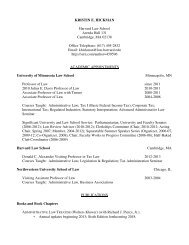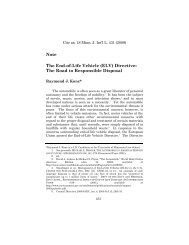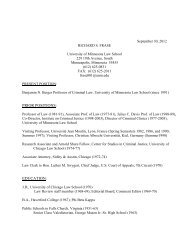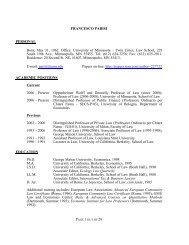Enabling Private Ordering - the University of Minnesota Law School
Enabling Private Ordering - the University of Minnesota Law School
Enabling Private Ordering - the University of Minnesota Law School
You also want an ePaper? Increase the reach of your titles
YUMPU automatically turns print PDFs into web optimized ePapers that Google loves.
2009] UMBRELLA CLAUSES 27<br />
Accordingly, “[i]f under <strong>the</strong> latter system <strong>of</strong> law [i.e. municipal<br />
law] no breach <strong>of</strong> contract occurs, it is not open to public<br />
international law to assert <strong>the</strong> contrary.” 60<br />
Despite <strong>the</strong> categorical divide between municipal and<br />
international law, contract claims and treaty claims, customary<br />
international law settled on an intermediary position that<br />
afforded some limited protection to investor-State contracts.<br />
Due to <strong>the</strong> lack <strong>of</strong> reciprocity <strong>of</strong> international law obligations<br />
between <strong>the</strong> host State and <strong>the</strong> foreign investor, <strong>the</strong> solution<br />
under customary international law was that a breach <strong>of</strong> an<br />
investor-State contract, while in itself unable to constitute a<br />
breach <strong>of</strong> international law, could constitute a violation <strong>of</strong> an<br />
inter-State obligation so long as <strong>the</strong> breach <strong>of</strong> contract also<br />
constituted a tort with respect to <strong>the</strong> investor’s home State. 61<br />
Such torts could exist in cases in which a host State<br />
expropriated an investor-State contract, 62 interfered with <strong>the</strong><br />
contract in an arbitrary manner, 63 or committed an independent<br />
breach <strong>of</strong> international law through a denial <strong>of</strong> justice, 64 always<br />
provided that <strong>the</strong> conduct <strong>of</strong> <strong>the</strong> State was noncommercial in<br />
character. 65<br />
A simple commercial breach <strong>of</strong> an investor-State contract by<br />
<strong>the</strong> host State was, by contrast, considered as insufficient in<br />
order to result in a violation <strong>of</strong> international law, since such a<br />
breach exclusively concerned <strong>the</strong> contractual bond, without<br />
touching on <strong>the</strong> international relations between States. 66 In<br />
sum, <strong>the</strong> position under customary international law was <strong>the</strong><br />
sustains but, because it sustains, may also modify or dissolve <strong>the</strong> contractual bond.’<br />
. . . If, <strong>the</strong>refore, <strong>the</strong> debtor relies on changes in <strong>the</strong> proper law, he does what he is<br />
entitled to do and cannot be charged with a breach <strong>of</strong> contract, his undertaking<br />
being limited to perform in accordance with <strong>the</strong> terms <strong>of</strong> <strong>the</strong> contract as sanctioned<br />
by <strong>the</strong> provisions <strong>of</strong> <strong>the</strong> proper law.”).<br />
60. Id. at 582.<br />
61. See Weil, supra note 3, at 137 (“la responsabilité de l’Etat naît en matière<br />
contractuelle d’éléments extérieurs au contrat, constitutifs en eux-mêmes d’un délit<br />
international”).<br />
62. See Jennings, supra note 58, at 173–79 (referencing <strong>the</strong> relevant case law).<br />
63. Id. at 165.<br />
64. See generally JAN PAULSSON, DENIAL OF JUSTICE IN INTERNATIONAL LAW<br />
(2005).<br />
65. See Stephan M. Schwebel, On Whe<strong>the</strong>r <strong>the</strong> Breach by a State <strong>of</strong> a Contract<br />
with an Alien Is a Breach <strong>of</strong> International <strong>Law</strong>, in INTERNATIONAL LAW AT THE TIME<br />
OF ITS CODIFICATION: ESSAYS IN HONOUR OF ROBERTO AGO, 401, 410–11 (1987)<br />
(providing case law <strong>of</strong> international tribunals endorsing this view).<br />
66. Weil, supra note 3, at 138 (“inexécution [du contrat] ne constitue jamais per<br />
se un acte contraire au droit international, et il faut toujours quelque chose de plus<br />
et d’autre pour qu’il y ait un acte internationalement illicite”).
















